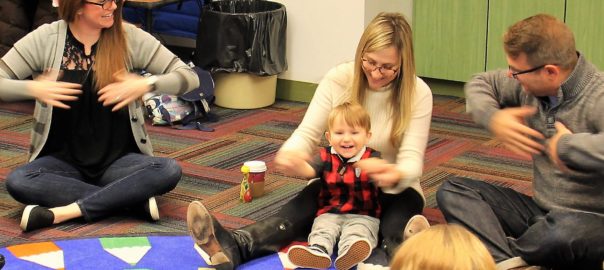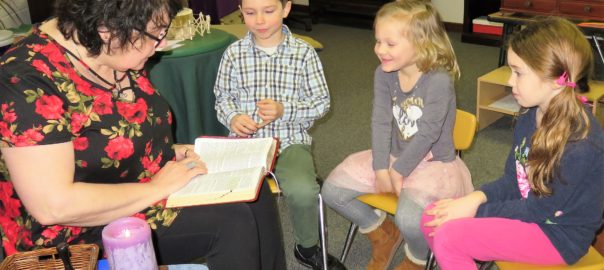The prenatal visits gave no sign of problems. But soon after Luke Worgul was born, doctors came back with the diagnosis: Luke had moderate hearing loss. At two months old, he was fitted with a hearing aid.
Today, thanks in part to a new early intervention effort at DePaul School for Hearing and Speech, Luke is a happy, well-adjusted two-year-old. His parents, John and Kristen Worgul of Squirrel Hill, couldn’t be happier.
“Luke is doing fantastic,” Kristen said. “DePaul School has meant so much to us and all the families going through this, giving kids the best outcomes possible.”
DePaul School, in Pittsburgh’s Shadyside neighborhood, was able to assist the Worguls and other parents thanks to a grant from Our Campaign for The Church Alive! The Baby and Parent Program at DePaul is supported by donors’ sacrificial gifts.
“We’re now able to help children as soon as they are diagnosed with hearing loss,” said Ruth Auld, executive director of DePaul School. “We started this group to get parents connected, and to know they’re not alone.”
“The goal is to have fun, socialize and learn,” said Michelle Parfitt, director of early intervention services. “It’s a key time to develop listening and spoken language skills.”
Audrey Craig was enrolled about three years ago in DePaul’s toddler program. Like 70 percent of their students, she had received a cochlear implant—a small electronic device that replaces the function of the damaged inner ear to provide sound signals to the brain.
Now, at age five, Audrey is ready to follow her sister Kelly, 9, from DePaul into the Mohawk Area School District in Lawrence County. Parents Justin and Tracy Craig, like the Worguls, are hopeful about the future.
“At first we were nervous, with the girls going to school at such a young age, but we’re very pleased,” Tracy said. “We know they will be able to do whatever they want in life, and we’re excited for this next step for Audrey.”
John Sopczynski, Jr. can provide parents with a glimpse what is possible. He received cochlear implants as a toddler and learned to listen and speak at DePaul until he was mainstreamed at St. Joan of Arc and St. Louise de Marillac schools in the South Hills.
He’s now earned an electrical engineering degree at Penn State University and is employed by Bettis Atomic Power Laboratory in West Mifflin. He’s also working toward a master’s of science in electrical engineering at the University of Pittsburgh and a graduate certificate in nuclear engineering.
“The teachers at DePaul are like an extended family to me,” Sopczynski said. “They prepared me well for school and the workforce, and continue to play a big role in my life.”
Founded in 1908 by the Diocese of Pittsburgh and the Sisters of Charity of Seton Hill, DePaul is the only listening and spoken language school in the tri-state region for students who are deaf or hard of hearing. The goal has remained the same—to prepare each child for success in the hearing and speaking world.
“The education and medical technology sectors are changing rapidly,” Auld said. “Cochlear surgery implants can now be performed at 12 months of age.
“Parents often walk through our doors feeling scared, many going through a grieving process. But they are leaving with smiles, knowing that nothing can hold their children back,” she said.
Kristen Worgul expressed her gratitude to supporters of the Church Alive! campaign.
“Thank you to the donors,” she said. “It means so much to us and all of the families going through these challenges to have the extra support.”


